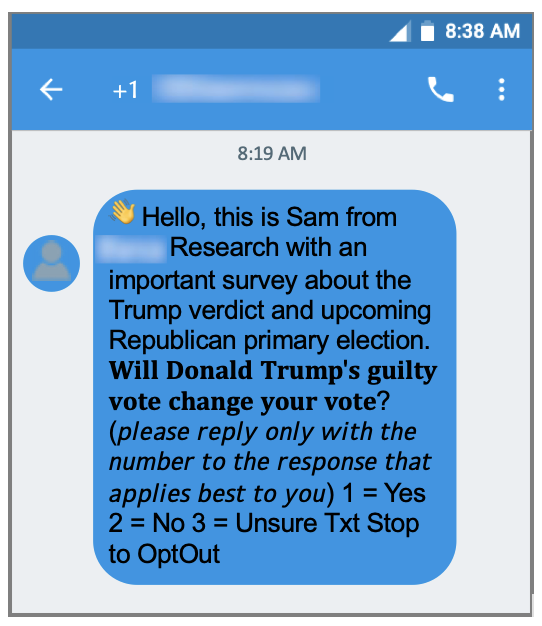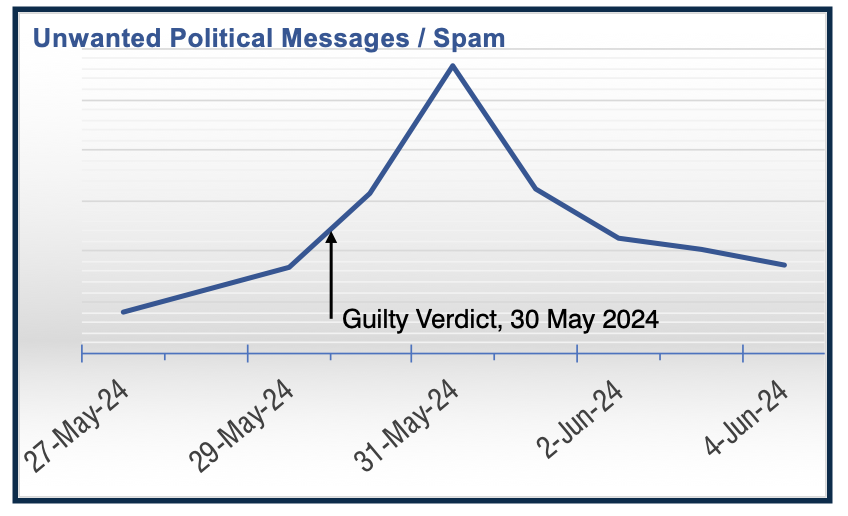U.S. voters’ appetite for digital information about the 2024 presidential election is growing. But as they consume news via digital media, including from mobile messaging channels, they must keep in mind that cybercriminals may be impersonating the sources that they trust.
Research helps to explain why attackers are so focused on exploiting users via these channels. Most U.S. adults (60%) prefer to get their news through digital media. An even higher percentage (86%) will often or sometimes consume news via a smartphone, tablet or computer. And most of the U.S. voting population (97%) has access to mobile messaging.
Many users have a high level of trust in mobile messaging. However, the effects of smishing, impersonation, unwanted spam and excessive political messaging puts this trust at risk. And while many voters today are aware of fake news and political impersonation in social media, they may not know that there’s a heightened risk for harm from mobile messaging and email-based impersonation tactics.
Election-related smishing tactics on the rise
The use of mobile-based political messaging has skyrocketed as a way for campaigns and legitimate organizations and interest groups to reach voters. At the same time, bad actors are aggressively using the mobile messaging channel for impersonation, smishing, fraud and unwanted spam. Proofpoint research shows that U.S. smishing (text message-based phishing) attacks have increased more than 7% over the past nine months compared with the prior nine months.
We compared the reported mobile political spam volumes for the first five months of the 2024 presidential election year to volumes in the same period of the 2022 midterm election year. The volumes in 2024 were 3X greater than those in 2022.
Unwanted political messaging skyrockets after Trump guilty verdict
In the 48-hour period after the guilty verdict in former President Donald J. Trump’s “hush money” trial, Proofpoint threat engineers saw a 240% increase in subscriber reports of unwanted political messaging. Report volumes reached into the tens of millions.

A sample of a Top 10 by volume, unwanted political message after the guilty verdict.

A graph that shows the relative change in unwanted political messages after the guilty verdict.
Simple steps to avoid risk
This election season, voters need to proactively protect themselves against impersonation attacks. And mobile operators need to protect their end users, too. In fact, we must all maintain a healthy level of skepticism. We need to approach unsolicited messages across mobile, email and social media with extreme caution—especially when a sender asks us to take urgent action.
To reduce your risk of exposure to malicious mobile messaging, follow some best practices. Do not open message attachments. And do not click on sent links. Instead, if you want to access a known website, enter the URL in your device’s browser. Be sure to thoroughly examine all election-related digital messages to confirm that they do not pose a risk.
How Proofpoint can help
Proofpoint is committed to reducing the risk of fraud and unwanted messaging that falls outside acceptable use policies to help protect trust in the mobile channel. We have the world’s most extensive threat intelligence. And we protect over 1.6 billion email and mobile accounts.
For mobile network operators, we are uniquely positioned to provide automated and predictive mobile messaging protection with offerings from Cloudmark, a Proofpoint company. As a platform for mobile messaging security, it can be deployed in the operator’s network or accessed in the cloud.
- When it is installed in the mobile operator’s network, it serves as a high-performance, carrier-grade security and anti-fraud tool. It delivers a powerful, feature-rich foundation with granular controls for fine-tuning.
- When the platform is accessed in the cloud, our platform seamlessly protects mobile devices. It also provides robust, hosted tools for support, reporting and enhanced insights into the network operator’s messaging ecosystem.
Proofpoint enables service providers to apply the most powerful security available across messaging streams—SMS, MMS and RCS. We provide network-level protection against rapidly morphing smishing, malware and spam by combining:
- Artificial intelligence
- Content and traffic categorization
- Patented detection technologies
- Content-based filtering algorithms
Cloudmark delivers robust commercial messaging control, visualization, reporting tools and content protection. It enables mobile operators to ensure compliance with their code of conduct and acceptable use policies in their commercial messaging channels. It also provides detailed insights into their commercial messaging provider’s specific campaigns.
For the latest threat insight from Proofpoint, see this page.
To learn more about Proofpoint mobile messaging solutions, visit the Cloudmark website.

